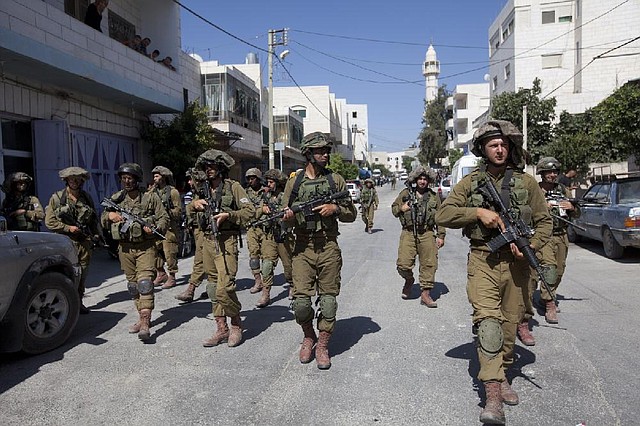Palestinian defends security policy
Cooperation with Israel to keep Hamas in check draws fire
Israeli soldiers search Wednesday for three Israeli teenagers in the village of Taffouh near the West Bank city of Hebron. The three are feared kidnapped by Palestinian militants and have been missing about a week.
Thursday, June 19, 2014
RAMALLAH, West Bank -- The Palestinian president on Wednesday defended his policy of security cooperation with Israel in a speech to senior Arab officials, even as Israeli forces escalated their most extensive West Bank crackdown in years in response to the apparent abduction of three Israeli teenagers.
President Mahmoud Abbas' comments were quickly condemned at home and shined a light on one of his most contentious policies -- working with the Israeli military to keep the Hamas militant group, which Israel accuses of carrying out the kidnapping, in check.
The three youths, Eyal Yifrah, 19; Gilad Shaar, 16; and Naftali Fraenkel, 16, who has dual Israeli-American citizenship, disappeared last Thursday while hitchhiking home from Jewish seminaries in the West Bank. Accusing Hamas of being behind the apparent abduction, Israel has begun a widespread crackdown on the group, arresting scores of members while conducting a feverish manhunt for the missing teenagers.
In a speech to Muslim leaders in Saudi Arabia, Abbas condemned the kidnapping, saying it had caused heavy damage to the Palestinians and that his forces were helping search for the missing teens.
"We are still looking and searching to find out who carried out such an act," Abbas said. "He who committed such an act wants to destroy us."
Abbas said he hoped to rescue the teens "because these youths are human beings, and we want to protect human lives." While accusing Israeli Prime Minister Benjamin Netanyahu of exploiting the crisis to inflict pain on the Palestinians, he also said the coordination with Israel is a Palestinian interest as well.
"We don't want to go back to chaos and destruction, as we did in the second [Palestinian] uprising," he told the Organization of Islamic Cooperation in Jeddah, Saudi Arabia. "I say it openly and frankly. We will not go back to an uprising that will destroy us."
His comments put additional strains on the new unity government that Abbas formed earlier this month with backing from Hamas. The government was meant to end a rift stemming from Hamas' takeover of the Gaza Strip seven years ago. But tensions remain, and Hamas is still in control of Gaza, while Abbas governs from the West Bank.
Abbas' comments quickly drew condemnation from Hamas. "These comments are based on the Zionist narrative," said Sami Abu Zuhri, a Hamas spokesman in Gaza.
In Washington, Abbas' words won praise from the State Department. "We were encouraged by President Abbas' strong statement to the Arab and Islamic foreign ministers today in Saudi Arabia," spokesman Jen Psaki said.
She said the U.S. has been in touch with both sides, urging restraint and continued security coordination.
Coordination between the sides was strengthened after Hamas seized Gaza in 2007, leaving Abbas only in control of the autonomous areas of the West Bank.
Abbas subsequently began a crackdown on Hamas in the West Bank to prevent a Hamas-led coup there. In the past seven years, forces loyal to Abbas have shut down many Hamas-linked charities and schools and have tried to dry up sources of Hamas funding.
Hamas, an offshoot of the regionwide Muslim Brotherhood, is deeply rooted in Palestinian society. The movement's political goal is an Islamic state in all of historic Palestine, including the territory that now makes up Israel. Israel and its Western allies consider Hamas, which has killed hundreds of Israelis, a terrorist group.
Late Wednesday, the Israeli military said two rockets were fired from Hamas-controlled Gaza into Israel. One rocket struck a house in southern Israel, causing damage but no injuries.
The relationship between Israel and Abbas' security forces is awkward at times, but ultimately beneficial for both sides. Experts say the coordination includes meetings, some sharing of intelligence and communication about what each side is doing.
A sign of the security coordination in recent days has been the relative calm in the West Bank as Israeli troops entered Palestinian cities that are nominally under Palestinian self-rule control. The main area of the operation has been Hebron, the largest Palestinian city in the West Bank.
The recent Israeli crackdown is the most extensive military ground operation in more than five years. Thousands of soldiers have fanned out across the West Bank, searching some 800 locations and arresting more than 250 Palestinians, most of them Hamas members.
Israel has not presented any firm evidence proving Hamas involvement in the teens' disappearance. The group has praised the apparent kidnappings, but not claimed responsibility.
Information for this article was contributed by Haitham Hamad and Yousur Alhlou of The Associated Press.
A Section on 06/19/2014

